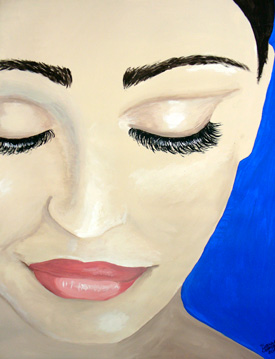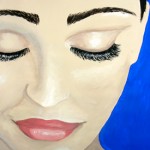Painting by Sarah Georges
When hair is dyed, concealers and polishes put on, dietary supplements taken and the shapes of bodies altered with plastic surgery, thoughtful consumption is deferred in favour of a youthful pursuit of beauty. The ideals on which these decisions are modeled, however, are inherently flawed. It is time to reflect on what one does to themselves when their bodily appearance is physically and chemically altered.
Cosmetic surgeries contain the most obvious and perhaps most destructive risks of the methods by which physical appearances are transformed. There are medical risks associated with the use of anesthesia and with surgical intervention. Psychologically, one must adjust to seeing a different body in the mirror every morning and recognizing it as belonging to oneself. Some people find this difficult to do, as some cosmetic procedures are associated with depression and body image issues.
But what about the majority, who opt to merely decorate the body we have as opposed to have it surgically made to look younger? Many beauty products (particularly shampoos, deodorants and skin creams) contain a class of chemical preservatives called parabens. Although Health Canada considers the current level of exposure to be within safe bounds, parabens have been under fire in recent years due to their possible link to cancers, particularly breast cancer.
Not surprisingly, hair dyes contain some pretty heavy-duty chemicals as well. One chemical in particular is phenylenediamine (PPD). Although not classified as a carcinogen, it is on Health Canada’s ‘chemical hotlist’ and is restricted solely to use in dyes. PPD is a common allergen, has links to asthma and potential connections have been made to several types of cancer. That said, we don’t just put chemicals on our bodies – we also put them in. Anti-oxidants have been thrust into the mainstream in recent years as a necessary anti-aging tool.
Anti-oxidants are found in a variety of foods such as green veggies, citrus fruits, nuts, and tomatoes. Their basic function is to hinder the destructive impact of our normal physiological processes, such as the processes that make us old. This is a good thing – eat up your leafy greens for their nutrients as well as their anti-oxidative properties. But should supplements be taken to aid in this? Anti-oxidants are toxic in large quantities, and have different functions depending on the type of antioxidant and body part in question. The use of medications, nutrient and enzyme supplements are widespread as a means of dietary control, and we lack a comprehensive understanding of how it all fits together.
As a bodily manifestation of youth is sought, the essence of what it is to be young at heart is missed. In pursuit of the vitality of youth, society may be slowly destroying itself. So what separates a person from being youthful and being decrepit? For me, it is laughter. It is the pursuit of knowledge and love and it is a lifetime of being yourself and enjoying the world around you.
